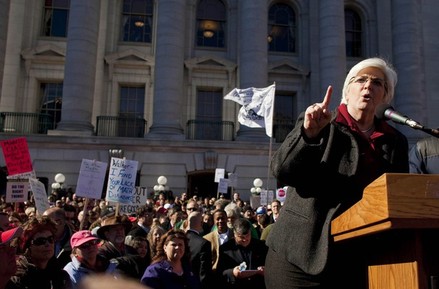Is This Any Way to Run a City’s Schools?
Leaked CTU Proposals Won’t Do Anything to Improve Schools’ Poor Performance

Big Labor will spend millions trying to remove Wisconsin Gov. Scott Walker from office but facts about the local economy and the finances of state government is making the argument for removal much more difficult. As the Wall Street Journal notes, Walker’s reforms are working — saving taxpayers money and putting people back to work:
It’s not turning out that way: The Apocalypse has not arrived for services, and Mr. Walker was able to balance the state budget without new taxes or looming deficits.
They swore revenge for his offenses, and last week Wisconsin Democrats delivered what they say are a million signatures for the recall of Republican Governor Scott Walker… to campaign against reforms that have already saved taxpayers tens of millions of dollars and rescued the state from a budget crisis. Game on.
Since last summer, Big Labor waged and lost a bitter fight over the election of a state Supreme Court Justice and spent millions trying to recall Republican state senators.
Last year state senator Spencer Coggs called Mr. Walker’s plan “legalized slavery” while others predicted disaster for school districts and public services.
In districts like Wauwatosa, Racine, LaCrosse and Eau Claire, the changes in health and pension contributions prevented layoffs that were expected to be widespread and in some cases allowed the boards not to fire a single teacher.
There are a few unfortunate counter examples—schools had locked themselves into long-term agreements with unions that predated Mr. Walker’s reforms. Unable to take advantage of the changes, Milwaukee and Kenosha, which serve more than 100,000 students altogether, saw layoffs of more than 800 teaching positions for the 2011-2012 school year.
The reforms have also let school districts introduce competition to reduce health-care costs. Under the old rules, most school districts bought health insurance through the WEA Trust, a virtual monopoly provider and a creature of the Wisconsin Education Association Council.
The Wisconsin-based MacIver Institute estimates that the Appleton school district was able to save $3.1 million over the previous year, despite continuing to get insurance through WEA Trust. With other insurance options available, WEA Trust had to cut its prices to keep the business. Based on statewide media reports, MacIver estimates that as of September 74 local units of government were saving some $162 million.
In mid-December, Wisconsin taxpayers got evidence of the direct benefits of reform in their latest property tax bills—an average annual increase of 0.3%, the smallest since 1996. Potential Democratic challengers will have to explain why the state should punish Mr. Walker for reforms that are helping taxpayers and local governments save money.
The only loser here are government unions that have less control over state and local politics. With the state no longer automatically withdrawing dues for the unions, labor leaders face the prospect of smaller checkbooks to buy politicians and intimidate reformers.
Mr. Walker reduced that influence on behalf of taxpayers, and the only point of the recall is union retribution designed to show other politicians that they don’t dare cross that line. The Wisconsin recall fight is the statewide election of the year, with implications for taxpayers nationwide.

Leaked CTU Proposals Won’t Do Anything to Improve Schools’ Poor Performance

Wherever Big Labor wields the power to collect forced union dues, union bosses funnel a large share of the confiscated money into efforts to elect and reelect business-bashing politicians. Employment growth tends to lag as a consequence.
Brief challenges Labor Board’s attempt to expand coercive, anti-employee organizing scheme